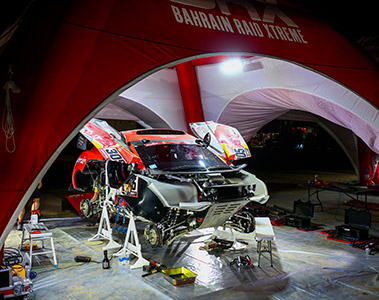 Amid the heat and sand of the Saudi Arabian desert, Covestro 3D printing materials and MakerBot technology aided UK motorsports company, Prodrive, as it produced end-use parts for its 2021 Dakar Rally racing car.
Amid the heat and sand of the Saudi Arabian desert, Covestro 3D printing materials and MakerBot technology aided UK motorsports company, Prodrive, as it produced end-use parts for its 2021 Dakar Rally racing car.
“Additive manufacturing and Covestro’s advice, expertise and broad range of materials gives Prodrive the opportunity to be price competitive and take cost out of the bill of materials, " Oliver Wood, Business Development Controller, Prodrive
Many automotive manufacturers are seeking the most efficient and cost-effective ways to manufacture end-use parts. UK automotive and motorsports specialist, Prodrive, took that challenge to another level when it needed to enhance the way it makes and replaces parts overnight, in the middle of the desert, in the 2021 Dakar Rally in Saudi Arabia.
As part of the Bahrain Raid Xtreme (BRX) team, Prodrive designed and built the Prodrive BRX HUNTER rally car for the race which runs for 14 days, in 40°C/104°F heat and over 7,500 km/4,660 mi of rugged desert terrain. The cars cover around 500 km/310 mi per day, and support teams only have a few hours for repairs at each staging point. Besides a wide range of onboard spares, Prodrive often needs to make or adjust new parts in the field. These are either made by hand or have to be couriered overnight.
Prodrive knew 3D printing technology would allow the team to print parts on-demand enabling it to redesign or produce new parts quickly in the field during pre-racing testing and even the race itself. Prodrive also realized it needed support from knowledgeable 3D printing experts and in particular a 3D printing material that would meet their requirements. The material had to have rigorous mechanical properties, print easily (in the back of a truck!) and be transported easily – following rally cars throughout the race.
The 3D printing materials experts at Covestro recommended Prodrive use Novamid® ID1030 CF10, a carbon fiber filled PA6/66 copolymer filament that can build parts that are stiff, tough and have high tensile strength. As a filament material, the material was ideal for transport in the support truck compared to powder or liquid.
When it came to printing, Covestro recommended a MakerBot METHOD X® 3D printer and helped Prodrive create and install a simple-to-deploy mobile additive manufacturing station on a support truck. This enabled Prodrive to adjust or build new parts in the desert during the race.
Prior to the race, Prodrive used Novamid® ID1030 CF10 to make nearly 30 end-use parts for car, including clutch and brake fluid reservoir mounts, suspension sensor holders, rear camera mounts and handbrake grips. As a result, 3D printing materials are now a core part of the bill of materials for the HUNTER car.
Paul Doe, Chief Engineer at Prodrive says, “The Covestro material has helped us move into the area where aluminum or even steel might have been used before. Also, thanks to the material’s heat resistance we are looking at using 3D printed parts in environments on the edge like engine compartments, close to the brakes or places where oil reaches temperatures of 150°C/302°F.”
“In motorsports we talk about marginal gains and doing everything one percent better. Covestro supports us with material selection, advice on design and print and challenges us to push boundaries to do something new,” says Oliver Wood, Business Development Controller at Prodrive.
During pre-race testing in Dubai, one driver found the dashboard needed to be reconfigured. Prodrive redesigned and 3D printed new parts with an adjusted display layout. “The Covestro and MakerBot mobile 3D print capability allowed us to discuss issues with the drivers during the day, design a new part in a couple of hours, print it overnight and install it the next morning. Before we would have ‘knife and forked’ something that was just about good enough to get the car going,” says Doe.
The mobile 3D printing station followed each leg of the race and was ready at overnight staging points to produce new parts.
Prodrive is expanding its partnership with Covestro to help develop the HUNTER car for the 2022 Dakar Rally and other races. Benefitting from the Covestro 3D printing expertise and materials, it will produce a series of 25 HUNTER cars for other race teams and private individuals. Prodrive and Covestro also plan to collaborate on other projects to increase the use of additive manufacturing materials and techniques in mainstream automotive part production.
In the 2021 Dakar Rally, the HUNTER car came 5th out of 60 cars in the T1 class – the highest rank achieved by a first-time competitor.
www,covestro.com